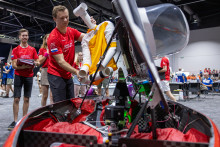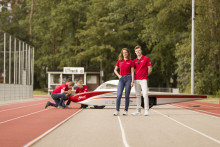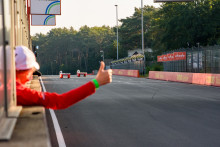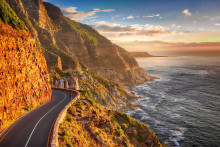How are things going now?
'We have just passed scrutineering, which is the inspection for safety requirements. It's just a formality, but it has been our time commitment for the past two days. Yesterday we did not pass the scrutineering in one go, but we did not expect that to happen any way. Any team that wants to perform seeks the limits anyway.'
I imagine it's a windfall after the malaise of the past few weeks?
'It is indeed a windfall after a series of setbacks. It started with the termite infestation in the storage box that was already here in Darwin. Then our transport box arrived seventeen days later than planned, leaving us with only two days until our first day of testing. During that first test day, we suffered damage, which meant we needed a week to repair the car. That worked out reasonably well. But when we could finally hit the public roads for the race simulation, we had to abort it early because of a forest fire.'
Murphy's Law, in other words. Will that flawed preparation affect the race?
'The fact that we couldn't complete the race simulation properly could potentially affect the race. You just want everything sorted out to perfection and that was not possible due to the circumstances. The preparatory weeks before the race should go smoothly, with as little stress and delay as possible. Unfortunately, that was not the case. But the fact that we are now through scrutineering gives us confidence. On the other hand, we don't know what impact the setbacks are going to have on the race. In any case, team morale is good. The setbacks throw oil on the fire, but you only come out of that stronger as a team. We are still full of confidence to go for the championship. This is the World Cup, we want to win it.'
On Sunday the race starts, but Saturday you still have qualifying ahead of you. How important is that?
'That's where we are putting our focus right now, because a good qualification can be crucial. That takes place on Saturday, at the Hidden Valley Raceway here in Darwin. The team that records the fastest lap starts the race with a thirty-second lead. And so there is always thirty seconds between each competitor. In other words, if you start at the back due to a failed qualifying session, you are already thirteen minutes behind the leader. Moreover, we expect the battle at the top of the leaderboard to be more exciting than ever before.'
How so?
'Because of the corona crisis, the last World Solar Challenge was in 2019. In those four years, the regulations have not actually changed, but the teams have had time to perfect their cars. For example, we had a short lead time, with a year and a half to design and build a car. Japan's Tokai University team already had a car since 2021 and has been perfecting it for the past two years. And then there is also increased competition from other teams...'
WORLD SOLAR CHALLENGE
The World Solar Challenge crosses the Australian outback over a distance of more than 3,000 kilometres. It starts in Darwin and goes via Alice Springs to Adelaide. Only solar-powered cars take part in the race. Solar Team Twente started twenty years ago and is racing this year with its tenth solar car, named RED X.
So it will be busy at the top?
'I expect the differences to be incredibly small. By nature, you have the three big teams: us, the TU Delft team and the Belgian Innoptus Solar Team. More challengers have joined us, partly because the market has not stood still. For instance, there has been a breakthrough in battery technology as well as in solar cell technology. So now there are four teams with a top battery - us, Delft, Belgium and the team from the University of Michigan. The team from the University of Groningen has incredibly efficient solar cells. The company that developed those perovskite solar cells chose one of the participants. Last week, we found out that the Groningen team has them. So we have four teams with a top battery, one team with top solar cells and the Japanese team is definitely a dangerous competitor as well.'
So an extraordinarily exciting edition of the World Solar Challenge awaits?
'Absolutely. We are not allowed to exceed the speed limit on Australian public roads. All the top teams will drive reasonably close to that top speed. The faster we go, the smaller the differences between us. It looks like it's going to be a neck-and-neck race next week.'






